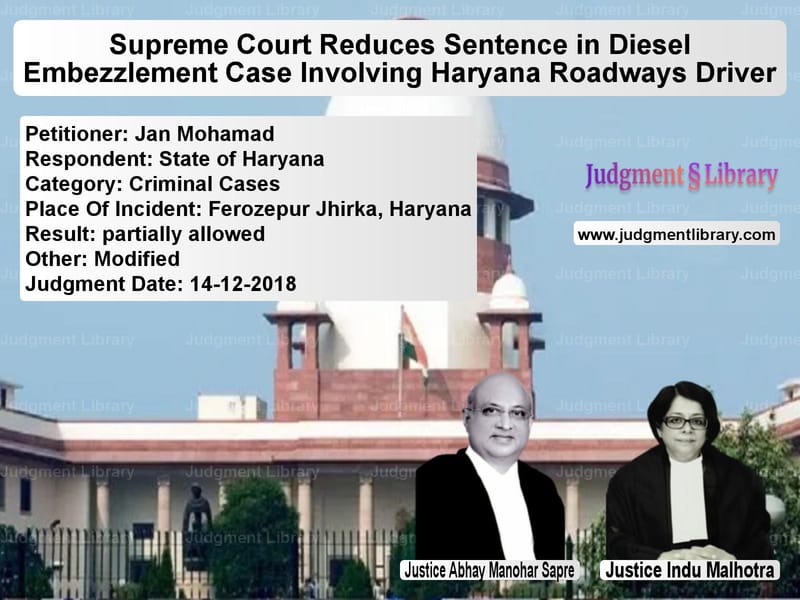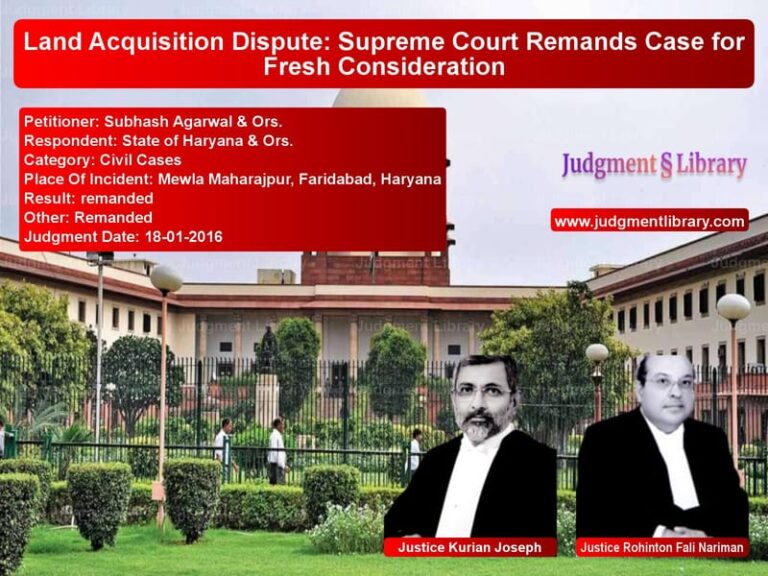Supreme Court Reduces Sentence in Diesel Embezzlement Case Involving Haryana Roadways Driver
The case of Jan Mohamad vs. State of Haryana revolved around the conviction of a Haryana Roadways driver for embezzling diesel meant for a passenger bus. The Supreme Court, in its judgment dated December 14, 2018, upheld the conviction under Section 409 of the Indian Penal Code (IPC) but reduced the sentence in consideration of the appellant’s age and health condition.
The Court acknowledged the gravity of the offense but took a lenient view on the sentence, balancing justice with the appellant’s current circumstances.
Background of the Case
The appellant, Jan Mohamad, was employed as a driver with Haryana Roadways and was posted at its Sub-Depot, Ferozepur Jhirka. In 1999, he was accused of embezzling 85 liters of diesel, which was meant to be filled in a passenger bus but was misappropriated.
The misappropriation was detected by the transport department officials, leading to the registration of a criminal case against the appellant under Sections 409, 420, and 120-B of the IPC. The trial court convicted him and sentenced him to three years of rigorous imprisonment along with a fine of Rs. 15,000. His appeal before the Additional Sessions Judge, Gurgaon, was dismissed. The Punjab and Haryana High Court also upheld the conviction in 2017, prompting the appellant to file a special leave petition before the Supreme Court.
Legal Issues Considered
The Supreme Court examined the following key legal issues:
- Whether the appellant’s conviction under Section 409 IPC was justified.
- Whether there was sufficient evidence to prove the embezzlement of diesel.
- Whether the sentence of three years of rigorous imprisonment was excessive, considering the appellant’s age and health condition.
Arguments by the Appellant
The appellant, Jan Mohamad, contended:
- That the evidence presented by the prosecution was not sufficient to prove embezzlement beyond a reasonable doubt.
- That he had served a significant period in jail during trial proceedings and post-conviction.
- That he was over 60 years old and suffering from ailments, making a long jail term unduly harsh.
- That he had no prior criminal record and had served Haryana Roadways faithfully for years.
Arguments by the State of Haryana
The prosecution, representing the State of Haryana, countered:
- That the appellant was caught red-handed in an act of embezzlement, and the evidence clearly established his guilt.
- That Section 409 IPC, which deals with criminal breach of trust by a public servant, was correctly applied.
- That a transport department employee entrusted with public resources must be held to high standards of integrity.
- That reducing the sentence might send a wrong message regarding corruption in public employment.
Supreme Court’s Judgment
The Supreme Court, comprising Justices Abhay Manohar Sapre and Indu Malhotra, upheld the conviction but decided to reduce the sentence. The key observations included:
- “The conviction of the appellant under Section 409 IPC does not warrant interference, as there is sufficient evidence to establish his guilt.”
- “Considering that the incident took place in 1999 and we are now in 2018, the prolonged litigation and the appellant’s age and health condition must be taken into account.”
- “The appellant has already spent considerable time in jail during trial and post-conviction.”
- “We, therefore, reduce the sentence to the period already undergone and enhance the fine from Rs. 15,000 to Rs. 25,000.”
Key Takeaways from the Judgment
- Conviction Under Section 409 IPC: The ruling reinforces that employees entrusted with public resources are liable under Section 409 IPC if they engage in embezzlement.
- Judicial Discretion in Sentencing: Courts may consider factors such as prolonged litigation, age, and health conditions while determining sentences.
- Balancing Punishment and Reform: The judgment illustrates the principle that punishment should serve both deterrence and fairness, without being excessively harsh.
- Enhanced Fine as a Compensatory Measure: Increasing the fine while reducing jail time serves as a financial penalty while addressing humanitarian concerns.
Final Directions
The Supreme Court ruled:
- The appellant’s conviction under Section 409 IPC was upheld.
- The sentence was reduced to the period already undergone.
- The fine amount was increased from Rs. 15,000 to Rs. 25,000.
- Failure to pay the fine would result in an additional three months of imprisonment.
Conclusion
This judgment highlights the Supreme Court’s approach in balancing justice with fairness in sentencing. While upholding the conviction for embezzlement, the Court considered humanitarian factors such as the appellant’s age, health, and prolonged litigation. The ruling reinforces the principle that while corruption must be punished, courts have the discretion to ensure that sentences are just and proportionate.
The decision serves as an important precedent for cases involving public servants convicted under Section 409 IPC and underscores the role of judicial discretion in sentencing policies.
Petitioner Name: Jan Mohamad.Respondent Name: State of Haryana.Judgment By: Justice Abhay Manohar Sapre, Justice Indu Malhotra.Place Of Incident: Ferozepur Jhirka, Haryana.Judgment Date: 14-12-2018.
Don’t miss out on the full details! Download the complete judgment in PDF format below and gain valuable insights instantly!
Download Judgment: Jan Mohamad vs State of Haryana Supreme Court of India Judgment Dated 14-12-2018.pdf
Direct Downlaod Judgment: Direct downlaod this Judgment
See all petitions in Fraud and Forgery
See all petitions in Public Sector Employees
See all petitions in Employment Disputes
See all petitions in Judgment by Abhay Manohar Sapre
See all petitions in Judgment by Indu Malhotra
See all petitions in partially allowed
See all petitions in Modified
See all petitions in supreme court of India judgments December 2018
See all petitions in 2018 judgments
See all posts in Criminal Cases Category
See all allowed petitions in Criminal Cases Category
See all Dismissed petitions in Criminal Cases Category
See all partially allowed petitions in Criminal Cases Category







